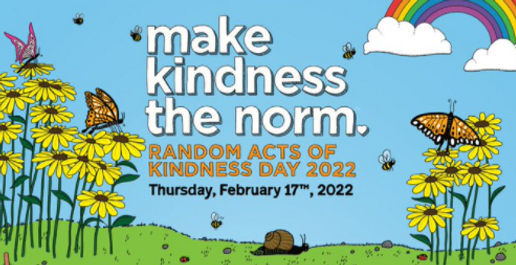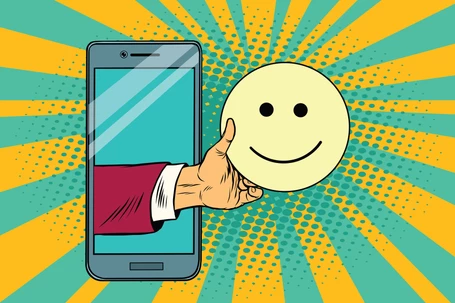Did you know we spend the equivalent of around 22 years, one month and four days of our lives online? Yes really!
Adults typically spend around 59 hours per week using the internet: on social media, gaming and doing online admin (i.e. household bits ‘n’ bobs such as banking etc.).
The internet, and particularly social media, offers endless opportunities to interact and engage with people globally but are these interactions always with the best intentions? And how likely are we, in a world when it has become the norm to passively scroll through feeds, to be proactively kind to others online?
At StrawberrySocial we believe in using the internet for good and it’s important to us that we help keep the places where we spend so much of our time safe for individuals and brands alike. So, on Random Act of Kindness Day, what better way to spread cheer than amongst the online communities where we interact most.
Let’s start with 5 easy ways to be proactively kind today:
1. Leave a genuine positive comment on a post or blog instead of just hitting the like button.
2. Share a positive or inspiring story from another account. Make sure you tag them!
3. Share some accounts that make you smile. It’s lovely to show appreciation. And, because we know some of you are asking here are some of our faves (do share some of your’s in the comments, and keep em clean people) –
- Aldi on Facebook,
- any of Innocent Drinks’ channels quite frankly,
- bwb.artist on TikTok,
- Fesshole on Twiter,
- Becky Holmes Hates Spinach (and spammers it seems)
- and who doesn’t like someone who raps about cats? We purr in your general direction Iammoshow!
- oh and we have to include WorkInSocialTheySaid, just ‘cause.
4. Engage with others. If someone has taken time to comment on your post, respond to them in a genuine way and start chatting.
5. Spread awareness of a favourite charity by sharing one of their posts, blogs, or events. Charities do some really uplifting and fun things online, get involved!

Kindness isn’t just for one day though and with this year’s RAK theme #MakeKindnessTheNorm, it’s important to consider your online community and the impact of your established routines. We asked our StrawberrySocial team of community management experts for some top tips on online kindness, and (not being a particularly quiet bunch) this is what they said:
Lead by example
If you are managing an online community, be abundantly clear from the start how the group will operate and encourage kindness and positivity in all your interactions and especially the posts you share. The rules and guidelines should be in a clear place for all new members to read and agree to. Make it a nice place to be.
Invest time in your community
Spend time connecting with your members, getting to know and understand them. Build relationships by chatting about life in general, sharing interests (such as pets, poems or weird and wonderful hobbies) or allowing members to share what they’re proud of. Promoting light-hearted and positive chatter helps establish a community with a kind ethos.

Bring people together
Sharing posts around themes that touch each person’s daily life can really help others to feel less alone and provide opportunities for your members to connect in a positive way. This has been really important throughout the pandemic when people have been feeling isolated and ended up turning more and more to their online communities for connection.
Type Happy
As a moderator, even if your day isn’t going well personally, it’s important to “smile from the wrists down” says our community manager Jo (now there’s an image). Smiling and keeping things upbeat on live feeds is infectious and it works wonders.
A genuine compliment –
 … no matter how small … can change the course of someone’s day. If someone is honestly sharing with you and your community, a simple “That’s amazing!” or “I’m so happy for you!” goes a long way.
… no matter how small … can change the course of someone’s day. If someone is honestly sharing with you and your community, a simple “That’s amazing!” or “I’m so happy for you!” goes a long way.
You get to display your incredible empathy, and they are rewarded knowing that someone not only listens to them, but truly cares about their feelings.
And if you are a member of an online community, be friendly. It isn’t possible (or even human) to agree with everyone you meet online but friendly discussion is possible when it is approached in a kind, thoughtful way.
And finally a word from our CEO, Rebecca:
“Nowadays, when online cynicism is celebrated and where it’s the norm to ‘cancel’ anyone who shares a different view… it’s all the more important to remember that social media does not speak for everyone. The cynical may roll their eyes at ‘be kind’ as just another gimmick but ignore them. At some point we need to ‘take the internet back’ – amplify and encourage all that is good about it.

Many of our clients are doing incredible work online, providing communities with a real place of safety and support (see NSPCC, Samaritans, NHS, Versus Arthritis). They prioritise ensuring that their platforms are monitored, moderated and provide trusted avenues of help to those who need it most.
This approach promotes discussion and understanding of others. Yes, many of the topics can be hard to deal with as people share their feelings about disability or the abuse they may have suffered as a child (or are still suffering now), but the fact that they can share (without leaving their house) and that we can help our clients to point them towards help is a hugely positive thing.
And, if the Twittersphere is getting too much for you, either bid it farewell or, remember that less than 30% (approx. my maths is not great!) of the UK actually have an account (and many of those may be duplications, dormant or bots). You can bet that it’s the very small percentage of people who are the ones who make the most noise.
Social platforms are a good place to raise awareness of issues – in a positive online discussion/debate – and we are certainly onboard with that. However, when it comes to negativity and abuse, remember, social media does not represent the voice of everyone. As in daily life, those that shout the loudest often get the most attention and, unfortunately, social media has provided them with the amplification they crave. As the saying goes, “take it all with a pinch of salt.”



 February 15, 2022
February 15, 2022  Share This Post
Share This Post